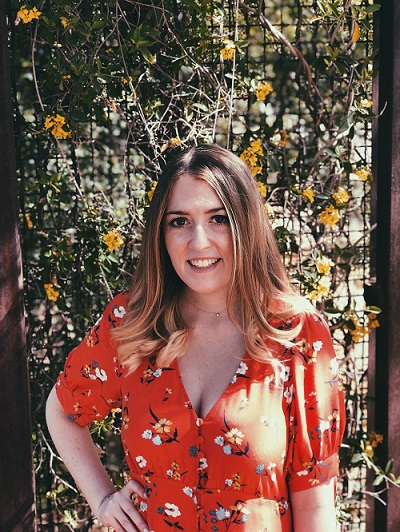ASU grad educates and helps the community with her passion for nutrition
During her time at ASU, recent grad Kayla Lundy helped so many people in the community with her passion for educating them about nutrition. Originally from Rockford, Illinois, Lundy graduated this spring with a BS in nutrition dietetics and worked as the nutrition coordinator for Sun Devil Fitness and Wellness. She managed a small team of nutrition educators from all four ASU campuses. Their mission was to promote nutrition education.
“I loved working with different community teams collaborating on wellness-centered events for the ASU student body.”

ASU grad Kayla Lundy
Lundy said she feels proud to have helped the Nutrition Education team build their professional reputation and leave a lasting impact on people’s lives even with the challenges of the last year.
“We are still a new and small team, so I am proud of all of the new connections that were built during my time as coordinator. Much like all of the coordinators within the SDFW, I am also proud of overcoming COVID restrictions and being able to use new resources to bring nutrition education to our students,” she said.
In the future, Lundy wants to work on creating policies that help build a much-needed nutrition education program for school-aged children, promote positive health conversations and deter people from the toxicity of diet culture.
As she wrapped up her time at ASU, Lundy shared advice she’d give to current students and what the future looks like for her.
Question: What was your “aha” moment when you realized you wanted to study the field you majored in?
Answer: To preface, I have another bachelor's degree in exercise science. During my senior year, I was diagnosed with a progressive muscle disorder, which threw a wrench in my aspirations of becoming an exercise physiologist or even going into physical therapy.
I had an interest in nutrition but decided to take time off before committing. I worked for my local YMCA and started a nutrition educator pilot program through CATCH and instantly fell in love with it. I saw my students learn new foods and become more interested in trying new fruits and vegetables, so that year I applied to ASU.
Q: What’s something you learned while at ASU — in the classroom or otherwise — that surprised you or changed your perspective?
A: There is no such thing as a "bad" food! Foods shouldn't have a moral component because all foods fit in a balanced diet. The focus shouldn't be placed on eating "perfect" all the time. Instead focus on your personal relationship with food. This is where true health improvement can be seen.
Q: Why did you choose ASU?
A: To be completely honest, the weather and location was ideal, but when visiting the campus and learning about the nutrition major department, I knew this was going to be an amazing experience.
Q: Which professor taught you the most important lesson while at ASU?
A: Although I learned so much from many professors throughout my time at ASU, I have to credit three very influential professors. Dr. Alexon, who taught me so much information about the macronutrients that I used in many of my team's presentations. Professor McCoy, who taught me about the importance of community nutrition and advocating for the underserved members of our community through the SDFW's partnerships with Pitchfork Pantry. Finally, Professor Kniskern, who taught me about the Health at Every Size movement, which set the tone for how I view and talk about health and nutrition.
Q: What’s the best piece of advice you’d give to those still in school?
A: Find your passion and let it inspire you, but also take time to focus on you. We experience a lot of stress as students; it's important to know how to manage that.
Q: What was your favorite spot on campus, whether for studying, meeting friends or just thinking about life?
A: The Downtown Phoenix SDFW will always have a special place in my heart since it is where I spent most of my time on campus.
Q: What are your plans after graduation?
A: I have a fellowship with St. Vincent de Paul this summer, then I begin my dietetic internship in the fall.
Q: If someone gave you $40 million to solve one problem on our planet, what would you tackle?
A: Definitely world hunger!